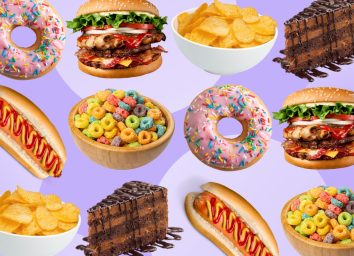Research Proves These Foods Are Just As Addictive as Drugs

If it seems like you can’t open a bag of potato chips without eating every single one or crave pizza and cookies with as much intensity as a smoker craves a cigarette, you could have a legitimate addiction. Some people chalk up eating junk food regularly to poor habits or a lack of self-control, but new research points to the existence of food addiction.
Nicole Avena, Ph.D., neuroscientist at Mount Sinai St. Luke’s Hospital in New York, has researched the science behind addiction. In a feature story for the September issue of National Geographic magazine titled “The Addicted Brain,” Dr. Avena and other researchers have discovered that people can become hooked on foods in the same way drug addicts itch for their next fix.
Although the Diagnostic and Statistical Manual of Mental Disorders (DSM) doesn’t list food addiction as a disorder, it does recognize another behavioral addiction: gambling. Like gambling, junk food has effects on the brain’s reward system, which is believed to lead to a behavioral addiction.
“Food addiction can be hard to define because it hasn’t been established as a medical condition by the medical community yet,” Dr. Avena explains. “However, individuals who feel that they might have an addiction to food can look out for certain signs, such as spending an excessive amount of time thinking about food or eating, bingeing, withdrawal signs when they deny themselves from junk food, and cravings that may interfere with their ability to fulfill work, school or home obligations.”
Processed Food is Like a Drug
Since people tend to crave foods that are higher in sugar and refined carbohydrates, it comes as no surprise that these were the types of foods researchers found to be the most addictive. Dr. Avena says her research found that foods that are more highly processed are more likely to be addictive,
“We found that pizza was the most addictive, followed by chocolate, chips, and cookies,” she says. “In addition, we found that foods that had a higher glycemic load, and those high in fat, were more likely to be addictive. As to why these foods are most addictive, it has to do with the fact that they can affect the brain reward systems in a way that can produce changes in the brain that resemble what one would see with a drug, like alcohol or nicotine.”
Although it’s important to eat these types of food in moderation, it may be physically impossible for someone with a food addiction to control themselves around their favorite takeout and snack foods.
How to Treat Food Addiction
If you find that food is taking over your life and making you unhappy, it may be time to seek treatment before more severe medical conditions arise such as obesity or diabetes. Some people may be unsure of how to seek treatment since food addiction hasn’t been an established medical condition. But there are courses of treatment that have been successful, Dr. Avena explains, such as 12-step programs that focus on food addiction, nutritional counseling, or even pharmacology in some cases.
“If you have concerns or eating behaviors, it is always a good idea to talk to your primary care physician, as they can often guide you on the best first steps to take,” she says. “Food addiction is a bit different for everyone, so there needs to be individualized treatments.”
Sometimes, downing an entire bag of potato chips or devouring a whole pizza isn’t just an unhealthy habit; it could be the sign of a larger issue. If you think you may be living with a food addiction, be sure to talk to your doctor and seek treatment.








